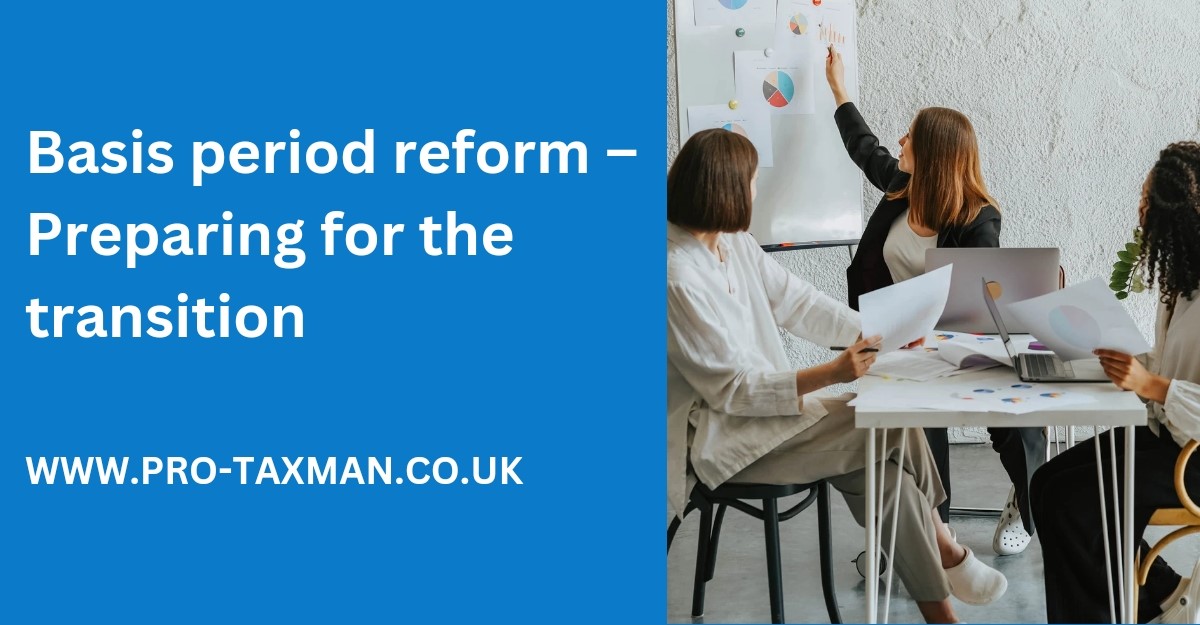As part of the move to Making Tax Digital for Income Tax Self-Assessment (MTD for ITSA), the basis period rules are being reformed. Despite the delay to the MTD for ITSA start date – which will now take effect from April 2026 rather than April 2024 – the reform of the basis period rules is to go ahead as planned.
Nature of the reform
Under the reform, sole traders and unincorporated businesses will, from 2024/25 onwards, be taxed on the profits of the tax year (the tax year basis) rather than, as now, on the profits for the accounting period ending in the tax year (the current year basis). If profits are prepared to a date other than 5 April or 31 March (which is deemed to be equivalent to 5 April), the profits from two accounting periods will need to be apportioned to correspond to the tax year. Accounting dates falling between 1 and 4 April are also treated as being equivalent to the tax year.
To enable traders to move from the current year basis to the tax year basis, 2023/24 is a transitional year.
Making the transition
Where an unincorporated business does not prepare accounts to 31 March or 5 April (or a date in between), the profits assessed in 2023/24 will cover more than a single accounting period.
The basis period for a continuing trade (i.e. one which commenced before 2023/24 and did not cease in 2023/24) starts on the day after the end of the basis period for 2022/23 and ends on 5 April 2024.
The basis period comprises up to three elements:
- the standard part;
- the transition part; and
- days following a late accounting date.
Not all parts will be applicable in all cases.
In addition, relief will be given in 2023/24 for any overlap profits arising on commencement or a change in accounting date which have not yet been relieved.
The standard part is the first 12 months of the basis period. This period starts the day after the end of the basis period for 2022/23. This will usually be the 12 months to the accounting date ending in 2023/24.
If the standard part ends before 31 March 2024 (as will be the case if the accounting date does not fall in the period from 31 March to 5 April), the basis period for 2023/24 will include a transition part as well as the standard part. If it ends on or after 31 March 2024 but before 5 April 2024, the trader is taxed on profits to the accounting date (referred to as a late accounting date); there is no need to calculate the transition element. However, an election can be made to disapply this rule and for the profits for the period from the late accounting date to 5 April 2024 to be taxed in 2023/24.
The transition part is the period that begins immediately after the standard part and ends on either:
- 5 April 2024; or
- the late accounting date.
If the trader has overlap profits which were taxed twice either on commencement or on a previous change of accounting date, these are relieved in calculating the profits assessed in 2023/24.
Example
A trader prepares accounts to 30 June. The basis period for 2022/23 on the current year basis is the year to 30 June 2022. In the 2023/24 transitional year, the standard part is the period from 1 July 2022 to 30 June 2023 and the transition part is the period from 1 July 2023 to 5 April 2024.
Spreading
Unless the accounting period matches the tax year, more than 12 months’ worth of profits will be assessed in the 2023/24 transitional year. To prevent the trader suffering an unusually high tax bill for 2023/24, the profits for the transition part, less any overlap relief, are spread over five tax years.
The effect of this is that 20% of this amount is assessed in 2023/24 in addition to the standard part, and 20% is added to the profits assessed on the tax year basis in each of the tax years 2024/25, 2025/26, 2026/27 and 2027/28. The trader will have higher tax bills in each of those years.
Where beneficial, the trader can elect for some or all of the spread profits to be taxed in an earlier year. This may be the case where the trader’s marginal rate is lower in an earlier year.
Change of accounting date
To prevent the need to apportion profits from more than one accounting period to arrive at the profits for the tax year, consideration could be given to changing the accounting date to 31 March or 5 April.
Need professional accounting service or accounting advice? Contact us to book a 15-min Free Consultation with us today.
To find out more please follow us on Facebook, Twitter, or LinkedIn. Feel free to contact us on 0333 006 4847 or request a call back by texting 075 6464 7474

